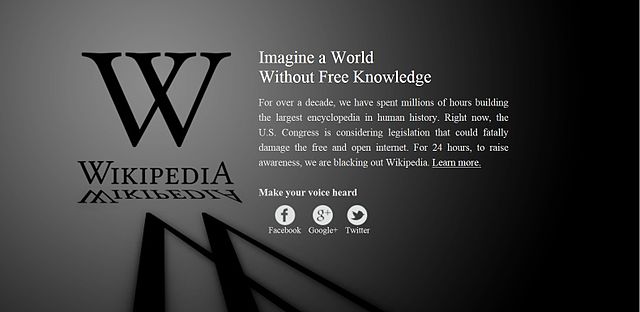
Recently, prominent internet players coordinated a protest against the government. And they won.
Wikipeidia shut down itself for 24 hours. Google put up a censorship protest sign. Several other sites took similar action. All because the US congress was considering two bills (PIPA and SOPA) sponsored by the media industry that claimed the internet industry is killing them. They said over $500 million a year is lost due to online piracy. This has to stop!
Really? Else what? Would society lose their artists and entertainment? Would there be no programs on TV, no music on the radio, no movies in the theater, no shows on Broadway? Conversely, what if the laws pass? Would artists make more money? Would I have better music, movies, or shows?
Let’s trace money and incentives. Simply: who pays? who gets paid? who really cares?
Artists or creators do not get much of the money. Most goes to those middlemen that distribute the art. This used to be a fair deal. Creating music costs comparably little. Most of the risks in this business lie in distributing and promoting creative content. Therefore the distributors and promoters should be rewarded.
But Internet changed the dynamics. Internet distribution costs nearly zero. People purchase based on reviews and referrals, and less on promotion. An unknown artist remains unknown until he or she has acquired fame and fans. Since consumers do not take promotion seriously, the best, and probably the only, way is to distribute the works freely. For established artists, they can charge much less for the music if they cut out the middlemen.
The production costs for TV programs and movies are still prohibitively high for them to be given away free. If everyone pirates and does not pay, these industries die. Consumers understand this point and are willing to pay reasonable prices. The media industry, however, resisted this option.
Hulu, major TV network’s portal, or cable operator’s portal offer a subset of the TV programs or movies. Some programs, particularly the popular ones, are simply not offered. Others appear 48 hours later and stay for only a short period of time. For this impatient and technically savvy generation of viewers, going directly to piracy is more reliable, more available, less restriction, free of charge, and of the same quality.
I use Comcast’s “catch-up” feature quite frequently. If I missed a TV show, I will go to “catch-up” and watch the same program on-demand. I don’t mind watching the commercials, but am annoyed that they don’t show up consistently — sometime 2 days later, sometime not ever. I have already paid the cable bill. I could have DVRed the program anyway. I don’t feel guilty doing a bit of searching and downloading.
Online and on-demand viewing is the new model. Soon, only sports programs will be watched live. People are willing to pay. But media companies forced them to pirate. More laws on anti-piracy are clearly not the solution.
Embrace the new world and create a new business model. If they don’t get the “Google generation,” they will just die.
